
 |
 |
 |

These dressing ACCESORIES may not be a collection of items with a special relevance by themselves, but they are able to create an external atmosphere to our existence. And might be possible, that thanks to the aesthetic strenght of these items, we will be able to express our deepest passions.
OUR FANS, as result of our craftmanship and team work, implies the effort of various people involved in the same project. Through the selection of the finest textils, woods, together with their painting and fretwork, we look for those contrasts and cromatic solutions accordingly to the aesthetics of our times. We are creating a warm object, pleasant to sight and touch that goes well with people in any social situation, without ever forgetting their usefulness.


When we talk about
![]() Tree wood we are refering to a special kind of wood with highest quality, texture and softness: pear trees, apple trees, loquats and cherry trees. Their detailed study leads us to achieve the appropiate selection of the most suitable wood for each kind of fans, in accordance with their characteristics in tone and their grain.
Tree wood we are refering to a special kind of wood with highest quality, texture and softness: pear trees, apple trees, loquats and cherry trees. Their detailed study leads us to achieve the appropiate selection of the most suitable wood for each kind of fans, in accordance with their characteristics in tone and their grain.
The rest of MATERIALS is not less important: first class cotton textiles, 100% natural, together with a satin and sandpapering finish which gives them that special texture to our touch.
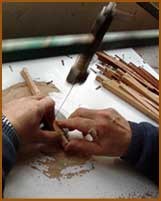
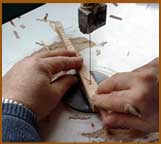
![]()
Nevertheless, this excellent raw material is just a canvas where is shown the work of our masters in FRETWORK and PAINTING, always searching for innovation looking for the most appropiate contrasts and desings which combine tradition and modernity.


As a novelty, FOLDING FANS in its first period (XVI-XVII century), had been associated with the highest social classes, and didn't reach to the rest of society until the XVIII century, according to some sources published in different european countries.
Curiously enough a EUROPE marked by military conflicts, apocalyptic visionaries and grandiloquent gestures welcomed the fans as an element of elegance and distinction. It was introduced by the Renaissances courts of Italy and Spain as an exotic and oriental object, and soon expanded being adapted to the prevailing taste of France and England.

OPENING AND CLOSING a fan with elegance soon becomes an art just for the fun of it, so that it will establish a lenguage and a code of behaviour. Maybe it was an appropiate means of comunication in a period where women lacked freedom of expression and movements; though it meant introducing oneself into a rhetoric of love, when love was considered an element of luck, a game where you could win or lose.
The difficulty in presenting this EXPRESSIVE METHOD here, lies in the adaptability of its own code and the ability to bring up to date this expressive method depends where it's used. We can mention here some of the most famous funny remarks [J. V. Duvelleroy. Le langage de L'éventail. Collected by Carmen Priego (Madrid 1995)]:

| - Holding the fan with your right hand in front of the face:
follow me. - Holding it with your left hand in front of the face: I'm searching for knowledge. - Keeping it on the left ear: please, let me alone. - Letting it slip over the forehead: you have changed. - Moving it with your left hand: we are watched. - Changing it into your right hand: you are daring. - Throwing it with the hand: I hate you. - Moving it with your right hand: I love another. - Leaving it slip over your cheek: I love you. - Showing it closed: do you love me? . - Leaving it slip over the eyes: please, go away. - Touching the edge with your finger: I would like to talk to you. - Leaning it on the right cheek: yes. - Leaning it on the left cheek: no. - Opening and closing it: you are cruel. - Leaving it hanging: we will carry on being friends. - Fanning oneself slowly: I'm married. - Fannig oneself quickly: I'm engaged. - Leaning the fan on the lips: kiss me. - Opening it slowly: wait for me. - Opening it with the left hand: come and talk to me. - Tapping it and closing it on the left hand: write to me. - Half-closing it in the right hand and in the left: I'm alone. - ... |
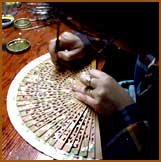
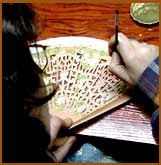
![]()
At the same time, our HAND PALMS and each of their FINGERS had areas where a letter was marked by touching that spot with the fan or a walking stick. One could create a whole conversation from a distance or it could rather be a criptic language for the uniniciated. "The andalusians women taught this alphabet to men, so that with the walking stick, the latter would answer to the questions made with the fan". [Montaner y Simón (Barcelona, 1887)].
Nevertheless, it is not until the XIX CENTURY, when the european society tends to the standardization of labour and business, that the fan acquires, like any other accesory, the importance of clothes and shoes. It is a moment when the society stratifies, with a complete disregard for the guild to which one belongs, and a moment when the fan goes beyond social classes, acquiring an importance for its usefulness and company.
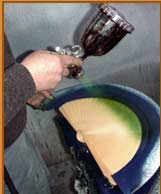

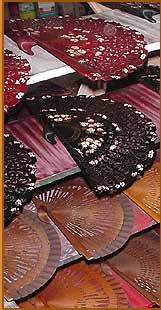

The least important thing at this moment might be to insist in its simbolic character as a power and defense in the hands of the first Samurais, or its arrival to the european courts from the Far East with spices and silk embroideries, a code of behaviour and conversation, wich explains practicals spreading among spanish society in the middle of the XVIII century, or its fall into disuse after the costumbrista life style afther the war.
We may have spent too much TIME to get rid of topics and superficialities to present all those accesories that make life easier and more pleasant for us, or perhaps it has been needed the passing of time to explain the symbol that every object entails in its acquisition and use. And it is not just that we have been able to demystify something as warm and close as a fan: parfumes, creams, clothes, jewellery, hair cutting or the way we behave in public have needed a kind of collective catharsis, a rite of normalization that, paradoxically, has allowed all men and women to accept themselves as they are.
So that, after so may years of History, SOCIAL MANNERS that characterize and make us different have lost that decisive importance which made them so changeable. Men and women have finally accepted things as they are.
BIENVENIDOS a un siglo al natural. BIENVENIDOS a
We WELCOME you to a century natural as it is. WELCOME to MALVI FANS.
Ramón Hernando
Marketing Director